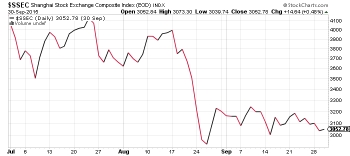
Currency Manipulation: The Silent Partner in International Trade
Trade deals are typically thought of as win-win scenarios. “You buy my stuff, I’ll buy yours; everybody profits!”
Slow down, Mr. Businessman. Take your eye off the pretty, shiny object, and look behind the curtain.
Proponents of the Trans-Pacific Partnership (TPP) trade agreement praise tariff reductions as the primary benefit of the trade agreement. But tariff reductions in no way guarantee a fair playing field within international trade. Foreign countries regularly use currency manipulation, border-adjustable taxes, subsidies, and a host of other arbitrary financial mechanisms to influence trade imbalances.
Currency devaluation gives foreigners an unfair trade advantage over the U.S., making foreign products cheaper in America, but American products more expensive overseas.
The TPP does not have provisions to address foreign currency manipulation. Yet without such provisions, the cost of doing business with many Asian countries can be prohibitive. Japan, China, Vietnam, Malaysia, and Singapore routinely devalue their currencies, making U.S. exports more expensive to their citizens, thereby decreasing both the quantity of U.S. products sold in their countries and the profit margins on those products.
In addition, currency manipulation has a see-saw effect: when U.S. products become more expensive in Asian countries, Asian products become cheaper in the U.S., thereby encouraging U.S. consumers to ignore U.S. products on store shelves, and instead reach for the cheaper, often-lower-quality foreign products.
When U.S. products sit unsold on retail store shelves, producers sell fewer products, often at marked-down prices. And the ripple effect continues: when a company is making less profit than expected, it has to cut back on spending, lay off workers, and even close its doors. It’s no wonder that 55,000 U.S. manufacturing facilities have closed their doors since NAFTA took effect!
China devalued its currency three times in late August 2015. The effects were profound. The Chinese stock market reacted by falling over 25%, causing a prompt 10% drop in the S&P 500 index.
Clearly, currency manipulation is no small matter.
The lack of currency manipulation protections in U.S. trade deals is a well-known problem. That’s a big reason why Republican U.S. Senators Jeff Sessions (AL) and Rob Portman (OH) oppose the TPP.
It’s not wise to lock the U.S. into an economic promise with countries that manipulate currencies.
Can the TPP be amended to fix this significant issue? Unlikely. Any changes to the trade agreement would require the trade ministers of the twelve partner countries to meet again, and renegotiate. New negotiations would open up many cans of worms.
Many industry factions are displeased with the outcome of the TPP, and would likely jump at the chance for renegotiation. Unfortunately, trade ministers taking a forceful stance was a significant cause of the TPP’s original delays. The ministers were compelled to compromise and sign the agreement at their Atlanta meeting in October 2015. It’s doubtful that they could be compelled to compromise and sign, yet again — especially since the TPP is already making its way through the ratification process in several of the partner countries’ legislatures.
Politicians have been too focused, for far too long, on the “free trade” sound bite, ignoring the pesky details which accompany 5,000-page trade deals. It’s time for voters to demand a more pertinent four-letter word: fair trade.
Chart courtesy of StockCharts.com.
Resources: China and the U.S. Treasury Bond Market: the Investment Threat Nobody’s Talking About — Crista Huff, Goodfellow LLC, 08-24-16
* * * * *
Crista Huff is a stock market expert and a conservative political activist. She is the Chief Analyst at Smart Investing in Turbulent Times; owner/operator of Goodfellow LLC, an outperforming stock market website; and she has worked with End Global Governance and economic groups to defeat Fast Track trade promotion authority and the Trans-Pacific Partnership trade agreement. Send questions and comments to research@goodfellowllc.com.
* * * * *
Investment Disclaimer
Release of Liability: Through use of this website viewing or using you agree to hold www.GoodfellowLLC.com and its employees harmless and to completely release www.GoodfellowLLC.com and its employees from any and all liability due to any and all loss (monetary or otherwise), damage (monetary or otherwise), or injury (monetary or otherwise) that you may incur.
Goodfellow LLC and its employees are not paid by third parties to promote nor disparage any investment. Recommendations are based on hypothetical situations of what we would do, not advice on what you should do.
Neither Goodfellow LLC nor its employees are licensed investment advisors, tax advisors, nor attorneys. Consult with a licensed investment advisor and a tax advisor to determine the suitability of any investment.
The information provided herein is obtained from sources believed to be reliable but is not guaranteed as to accuracy or completeness. When information is provided herein from third parties — such as financial news outlets, financial websites, investment firms, or any other source of financial information – the reliability or completeness of such financial information cannot be guaranteed.
The information contained on this website is provided for informational purposes only and contains no investment advice or recommendations to buy or sell any specific securities. This is not an offer or solicitation for any particular trading strategy, or confirmation of any transaction. Statements made on the website are based on the authors’ opinions and based on information available at the time this page was published. The creators are not liable for any errors, omissions or misstatements. Any performance data quoted represents past performance and past performance is not a guarantee of future results. Investments always have a degree of risk, including the potential risk of the loss of the investor’s entire principal. There is no guarantee against any loss.









Leave a Reply